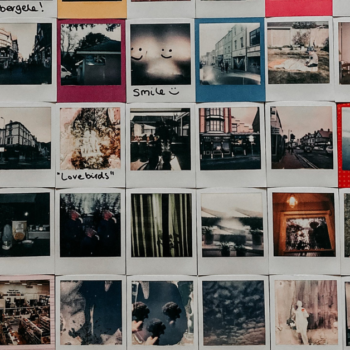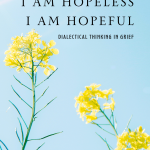I am Hopeless; I am Hopeful: Dialectical Thinking in Grief
/ Coping with Grief : Litsa
When I tell people that philosophy is what got me through my dad's death, they look at me like I have two heads. I won't bore you with the details, because I've written about how I used philosophy instead of grief counseling here before. But what I haven’t talked much about is how philosophy is almost as helpful as my background in mental health as a grief therapist. Seriously. From existential dread to the phenomenological structures of human experience, grief pushes us to examine “big” questions. It also pushes us to make sense of a world that doesn’t make sense. People often find themselves stuck between thoughts and feelings that feel like contradictions. Plato or Hegel would have called this a dialectic, though most people grieving would find that a useless description. Because, though dialectical thinking in grief is incredibly common, almost no one has heard of it.
On the surface, dialectical thinking feels confusing at best and terrible at worst. You're in a black hole of grief, trying to make sense of the zillions of feelings that come with that. And then suddenly you're trying to reconcile feelings and thoughts that feel like they can't possibly go together. Or you worry that a certain feeling means that your grief isn't as bad as you know that it is.
Dialectical thinking is holding two things that are contradictions. Plato explored this through debates: his famous Socratic Method. As two philosophers debated, what was most important was the clarity that came from exploring these contradictions. Hegel later had some harsh words about Plato’s dialectic, refining his own. I won’t bore you with the details. But the incredible insight Hegel had (that I’m absolutely, positively sure he never imagined some grief therapist-blogger would be writing about 200+ years later) was this: Almost everything distills down to contradictions. He thought that there was value in the work we do exploring these contradictions, finding ideas that replace the previous but still retain the contradictions.
Uh, What on Earth Does This Have to Do With Grief?
This is probably reinforcing every stereotype that philosophy is abstract hooey, but I promise it isn’t. Hegel’s idea that these contradictions are not problems, but rather things that exist and can move us forward, translated beautifully into psychology. Klaus F. Riegel suggested that development through life is predicated on contradiction. He suggested that, as we age, we learn the inevitability of these contradictions. We sit with them rather than trying to escape them.
Even if you aren’t comfortable with the dialectical nature of the world, learning to recognize and sit with these dialectical thoughts can be of use in grief. As humans, we like things to be in nice, neat, tidy boxes. Things are good or bad, right or wrong, happy or sad. It would be so nice and simple if life worked that way, wouldn’t it? But the older we get, the more moments we encounter that challenge that reality. Humans are complicated. Life is complicated. We’re complicated.
So how do you notice and get comfortable with dialectical thinking? The first thing to do is look for all-or-nothing thinking, either-or thinking, or any extremes in your grief-thinking. Like what, you may be wondering? Here are some examples:
- I will never be happy again.
- My friends are terrible. They keep [insert insensitive thing here].
- No one can help me because no one understands my grief.
- I tried a support group once and I didn't like it, so therapy and groups aren't for me.
Needless to say, there are many, many more.
Now think about what it would look like to take any of these thoughts and consider if something contradictory could also be true. This is not replacing the thought with another thought that is true instead. Rather, it is sitting with the contradiction; the fact that both are true.
- I will never be happy in the way I imagined, and I am still capable of happiness.
- My friends are not providing me the grief support I need right now, but they have been good friends in the past and may be capable of being good friends again.
- No one understands my grief, but they may still be able to help me in other ways.
- I tried a support group that I did not like. It wasn't right for me, but another group or therapist might be a better fit.
In each of these cases, the initial thought is not false or replaced. Rather, a thought exists alongside it, and—when we can hold both thoughts—there is often new flexibility or space that emerges.
Okay, so I Need to Introduce Dialectical Thinking Into My Thoughts?
Yes and no. There are places where you are probably already thinking dialectically, but you might not be comfortable with these thoughts. In these situations, it is helpful to notice the uncomfortable dialectical thoughts, to explore and sit with them:
- I'm devastated by this loss, and I am relieved that my loved one is no longer suffering.
- I would give anything to have my loved one back, and I have grown as a result of this loss.
- I've been destroyed by what I lost, and I am grateful for what I still have.
In each of these, it can be easy to assume that the second thought somehow reduces the pain or truth of the first. But no! The reality is that both are wholly true. Neither diminishes the other because that is not how emotions work. One emotion does not take away from another. We can feel each in their entirety, all at once.
This either makes tons of sense or is as clear as mud. Either way, we really do believe spending some time with dialectical thinking can be really useful, so we hope you’ll give it a shot.
As always, subscribe to get our free, weekly grief support newsletter straight to your inbox.
We wrote a book!
After writing online articles for What’s Your Grief
for over a decade, we finally wrote a tangible,
real-life book!
What’s Your Grief? Lists to Help you Through Any Loss is for people experiencing any type of loss. This book discusses some of the most common grief experiences and breaks down psychological concepts to help you understand your thoughts and emotions. It also shares useful coping tools, and helps the reader reflect on their unique relationship with grief and loss.
You can find What’s Your Grief? Lists to Help you Through Any Loss wherever you buy books:






Bryan Stokes October 5, 2021 at 7:30 am
I don’t know what I will feel like, the 1st anniversary of my mom passing is coming up on the 15th of October,and I am going to see how it goes remembering the Love she provided us.
I am glad I am able to read the article’s and various comments they allow me the opportunity to pace myself and balance Thank you.
Margaret June 10, 2021 at 11:02 am
It’s been 21 weeks since my husband died from covid19.
I will never feel love again, part of me died with him & I am just waiting now. Just waiting. Nothing else matters. If only he knew how important he was in so many lives. All my relationships with friends & family has changed, I simply don’t care enough about anything any more. Just waiting.
karl b August 24, 2022 at 11:45 am
Margaret, I feel your grief and am with you.
KATHLEEN April 27, 2021 at 9:32 am
Yesterday was the 5th anniversary of Mom’s death. I had not had one of those overwhelming episodes of grief in quite sometime, so I thought ‘Thank God, I will not feel that again’ I thought I would remember her and be fine.
Welp – not what happened. I fell apart and it was rougher because I had set myself up and had not prepared for the really hard hard day.
Today I feel hung over from the emotional day. But I am okay.
I appreciate your columns and posts. I would not have been able to make it thru these past 5 years without you.
Thank you again.
Kathleen